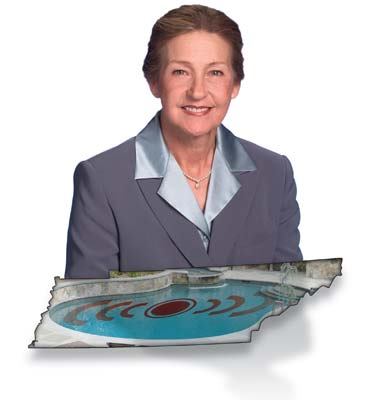Another high-profile drowning has led to a state law requiring pool alarms on all new residential swimming pools.
The legislation, sponsored by Tennessee state Sen. Charlotte Burks, D-Cookeville, applies to all private pools built after Jan. 1, 2011.
It is known as “Katie Beth’s Law” after 17-month-old Katie Beth Maynard, the great-granddaughter of Burks who drowned in an aboveground pool in 2009.
“For the most part, we encourage our customers to have some sort of alarm system on their pools,” said Richard Petty, owner of Petty Pools Inc. in Gordonsville, Tenn., and president of the Middle Tennessee Chapter of the Association of Pool & Spa Professionals.
“So this isn’t much of a deviation from what we recommend,” he added. “But my concern is that after an inspector approves a pool because [it’s] got an alarm, people tend to get a false sense of security that they no longer need to watch their kids. It all comes down to adult supervision around the pool.”
Introduced in January, the new law is similar to one passed by the New York state legislature in 2006. However, New York’s law applies to commercial as well as residential pools, while Tennessee’s only extends to private vessels.
As written, Tennessee’s legislation further prohibits an electrical inspector from giving final approval for the pool’s wiring unless an alarm has been installed. In addition, signs reading “State Law Requires a Pool Alarm be Installed” must be posted by anyone who sells a pool.
A first violation brings a fine of up to $100; subsequent offenses carry penalties up to $500.
Many cities and states throughout the country already require some type of barrier or protective mechanism around pools — with alarms listed as an option. But some pool industry advocates question whether the law, unusual in its focus though not entirely unique, is broad enough in its scope.
For one thing, it fails to address any other types of barrier protection, noted Jennifer Hatfield, head of government affairs for APSP and the Florida Swimming Pool Association.
“[We] will encourage Tennessee to consider a more comprehensive approach that’s consistent with the Virginia Graeme Baker Pool and Spa Safety Act, the ICC barrier code requirements and the types of legislation many other states have adopted,” she said. “The law is well-intentioned, but it may not be comprehensive enough. It also does not address pools less than 36 inches in depth, and it defines alarms differently from the existing consensus standards.”
Meanwhile, Tennessee pool builders remain wary of openly opposing a law aimed at reducing childhood drowning, lest they appear unsupportive of the cause. But some still caution about a one-size-fits-all approach to pool safety. Others worry about false alarms and/or homeowners disabling the devices once electrical inspectors have given final approval.
“It’s a hard one to fight,” Petty said. “But we’re planning to contact our state legislators, and we’ll have a formal response to it.”



